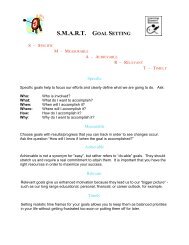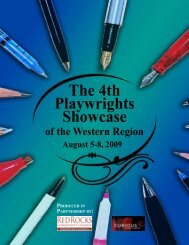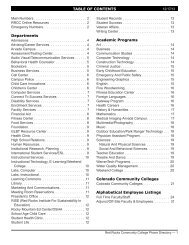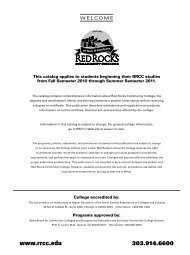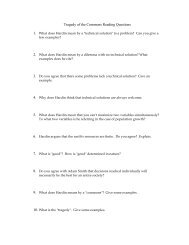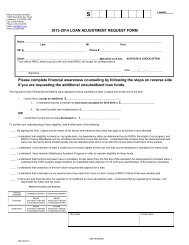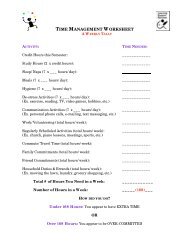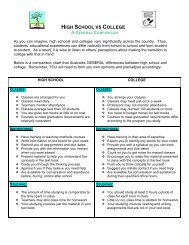opportunities, options, excellence - Red Rocks Community College
opportunities, options, excellence - Red Rocks Community College
opportunities, options, excellence - Red Rocks Community College
You also want an ePaper? Increase the reach of your titles
YUMPU automatically turns print PDFs into web optimized ePapers that Google loves.
EIC 174 Tuning DDC/Process<br />
Control Loops<br />
1.5 Credits<br />
This course investigates process characteristics<br />
and process control loops to learn quick<br />
and proper controller adjustment for good<br />
response. Topics include defining proportional<br />
band, integral and derivative, formal open and<br />
closed loop tuning methods, and advanced<br />
control methods. Students use computer simulation<br />
software to learn the concepts of proportional<br />
band, integral and derivative and<br />
practice different tuning methods. The computer<br />
simulation reduces the time necessary to<br />
set up the exercise and allows the student to<br />
concentrate on the concepts being taught.<br />
EIC 180 Electrical Maintenance<br />
Techniques<br />
4 Credits<br />
This course introduces students to common<br />
electrical repairs, electrical systems, tools and<br />
test equipment. Topics include replacing or<br />
repairing such devices as receptacles, light<br />
fixtures and ballasts, circuit breakers, fuses<br />
and switches. Electrical safety and code applications<br />
are also discussed and practiced.<br />
EIC 184 Maintenance Management<br />
1 Credit<br />
This course covers the critically important but<br />
often overlooked component of maintenance<br />
management. It is imperative that, maintenance<br />
organizations be managed by people<br />
who understand the techniques for the development<br />
and administration of proven programs.<br />
In this course, you will learn how to<br />
implement a maintenance program or<br />
improve an existing program. In the end, you<br />
will know how to reduce unscheduled overtime,<br />
excessive material costs, and the number<br />
of breakdown repairs.<br />
EIC 190 Electrical Code Calculations<br />
4 Credits<br />
This course discusses calculations used in the<br />
application of the National Electrical Code.<br />
Sizing of branch-circuit and feeder conductors,<br />
and calculating ratings of protective<br />
devices are emphasized.<br />
EIC 205 Advanced Electrical<br />
Planning<br />
4 Credits<br />
This course explores the planning and layout<br />
of large commercial and industrial electrical<br />
installations.<br />
EIC 210 Advanced National<br />
Electrical Code<br />
4 Credits<br />
Prerequisites: EIC 130, 135 or permission of<br />
instructor<br />
This course is an Advanced National<br />
Electrical Code course for the in-plant technician.<br />
The course emphasizes interpreting<br />
NEC rules that apply to industrial and commercial<br />
installations. Maintenance electricians<br />
and residential wiremen desiring to upgrade<br />
their knowledge of these rules can benefit<br />
from this class.<br />
EIC 215 Advanced Code<br />
Calculations<br />
4 Credits<br />
Prerequisite: EIC 190 or permission of<br />
instructor<br />
This course is an extension of EIC 190.<br />
The course emphasizes calculations for sizing<br />
conductors, conduits, fittings, protective<br />
devices, relays related to branch circuits and<br />
feeders for motor loads. Other loads as they<br />
apply to industrial and commercial situations<br />
are also explored. Sizing of transformers and<br />
power factor correction calculations are discussed<br />
as well.<br />
EIC 217 Electrical<br />
Estimating/Costing<br />
4 Credits<br />
The fundamentals of electrical estimating,<br />
material takeoffs from prints, required labor<br />
hours, material loss allowances and scheduling<br />
to ensure orderly work progress are all<br />
discussed in this course.<br />
EIC 220 Industrial Electrical<br />
Controls I<br />
4 Credits<br />
Prerequisites: EIC 105 or permission of<br />
instructor<br />
This course studies the application of electrical<br />
and electromechanical sensing and control<br />
devices; heating, ventilating and air conditioning<br />
applications; motor control; conveyor drives;<br />
and other industrial applications.<br />
Students design control systems to meet<br />
assigned conditions, use principles of relay<br />
logic to prepare correct ladder diagrams, and<br />
wire up, test and trouble-shoot their systems<br />
in the laboratory. The course stresses accuracy,<br />
safety and National Electric Code requirements.<br />
EIC 221 Trouble Shooting Electrical<br />
Control Circuits<br />
1.5 Credits<br />
This course is designed to bridge that gap<br />
between the teoretical knowledge and critical<br />
thinking skills needed on the job. you will<br />
spend a minimum of 50% of the time actually<br />
working at a troubleshooting station with circuits<br />
that are identical in every respect to<br />
motor control circuits in a plant. There is no<br />
discussion of electron theory, magnetism, or<br />
any other basic subject in this course. It is<br />
devoted exclusively to teaching hands-on<br />
troubleshooting.<br />
EIC 222 Introduction to<br />
Instrumentation and Process Control<br />
1.5 Credits<br />
This course investigates theory of industrial<br />
instrumentation measurement through process<br />
control. Topics include theory and measurement<br />
methods for temperature, pressure, level<br />
and flow. Students use hands-on training<br />
equipment to measure temperature and pressure.<br />
Test equipment is used to simulate a<br />
two-wire transmitter and a current signal for<br />
calibration of an I/P transducer.<br />
EIC 225 Programmable Controllers<br />
4 Credits<br />
Prerequisite:EIC 105 and 220 or<br />
permission of instructor<br />
This course studies the use of solid-state control<br />
equipment, primarily the programmable<br />
controller and associated solid-state sensors to<br />
control equipment, machinery or complete<br />
processes. Topics include concepts of solidstate<br />
logic; characteristics of solid-state sensors;<br />
conversions of relay logic control systems<br />
to programmable control systems; and<br />
microprocessor-based systems and remote<br />
control of processes. Students design, implement<br />
and test control systems in the laboratory<br />
to meet specifically assigned control problems.<br />
This course emphasizes accuracy, safety<br />
and National Electrical Code requirements.<br />
EIC 226 Understanding<br />
Programmable Logic Controllers<br />
Advanced<br />
1.5 - 2.0 Credits<br />
Prerequisite:EIC 224 or permission of<br />
instructor<br />
This course studies the advanced uses and<br />
applications of programmable logic controllers<br />
toward automated equipment,<br />
machines and processes. Included are the<br />
functions of PLC hardare componenets, converting<br />
relay logic to ladder logic, comprehending<br />
ladder logic instruction functionality<br />
and identifying the PLC’s data structure.<br />
Students use hands-on training equipment to<br />
create, implement and troubleshoot ladder<br />
logic programs that simulate real automated<br />
machine control and processes.<br />
<strong>opportunities</strong>, <strong>options</strong>, <strong>excellence</strong> 134



